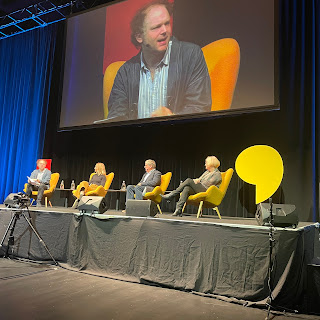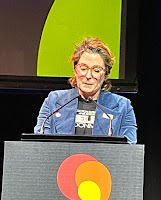Monday, 30 May 2022
A Beautiful Mind
Saturday, 28 May 2022
Sydney Writers' Festival 2022 - Day Three
Joined by my festival friend, we saw three sessions on Sunday 22 May 2022. This was the day after the federal election, and while the full results were still being tallied, it was clear that the Morrison government had lost and that there would be a new Labor government. The whole day felt more hopeful and the election was clearly on the minds of many speakers as we looked forward to a new government and a kinder, gentler nation.
Where Angels Fear To Tread
Radical Inclusive Rebellious
I was wrong
Well, that was the end of my time at this year's Sydney Writers' Festival. It was great to be back, attending events like this, after living like a hermit for the past two years. With COVID precautions in place, respected by most attendees, I was able to safely attend and feel relaxed in the space. I come home with many memories and a stack of books to read. Special thanks to my festival friend for being a great companion and choosing such good sessions.
- Day 1 - Includes Sean Kelly, Judith Brett, Jackie Huggins, Melissa Lucashenko, Sarah Krasnostein, Richard Fidler, Sisonke Msimang and Clare Wright
- Day 2 - Includes Barrie Cassidy, Jennifer Down, Hannah Kent, Garry Disher, Damon Galgut and Larissa Behrendt
- Day 3 - Includes Chris Masters, Kate McClymont, Nakkiah Lui, Marica Langton, Jane Caro and David Marr
Sydney Writers' Festival 2022 - Day Two
Joined by my festival friend, we saw four sessions on Saturday 21 May 2022
Barrie Cassidy and Friends: Election 2022
Jennifer Down and Hannah Kent
Small Towns, Big Secrets
Limits of Imagination
- Damon Galgut - The Promise
- Maxine Beneba Clarke - How Decent Folk Behave
- Hannah Kent - Devotion
- Day 1 - Includes Sean Kelly, Judith Brett, Jackie Huggins, Melissa Lucashenko, Sarah Krasnostein, Richard Fidler, Sisonke Msimang and Clare Wright
- Day 2 - Includes Barrie Cassidy, Jennifer Down, Hannah Kent, Garry Disher, Damon Galgut and Larissa Behrendt
- Day 3 - Includes Chris Masters, Kate McClymont, Nakkiah Lui, Marica Langton, Jane Caro and David Marr
Thursday, 26 May 2022
Sydney Writers' Festival 2022 - Day One
For the first time since 2019, I have attended the Sydney Writers' Festival, attending ten sessions over the three days. It was great to be back, with this my first major event outing since COVID began.
Here's a run-down of my first day at the Festival - Friday 20 May 2022
The Theatre of Politics
But Not Forgotten
Friends, Romans, Countrymen: Great Oratory and Speechifying
Thoughts on Day One
 It was a cold and wet day in Sydney. On my way in to Carriageworks for the festival, despite an umbrella and raincoat, there was no way to keep dry. But fortunately, I had put all my books inside a wet bag so they survived the weather.
It was a cold and wet day in Sydney. On my way in to Carriageworks for the festival, despite an umbrella and raincoat, there was no way to keep dry. But fortunately, I had put all my books inside a wet bag so they survived the weather. - Sean Kelly - The Game
- Sarah Krasnostein - The Believer
- Melissa Lucashenko - Too Much Lip
- Chloe Hooper - Bedtime Stories
- Day 1 - Includes Sean Kelly, Judith Brett, Jackie Huggins, Melissa Lucashenko, Sarah Krasnostein, Richard Fidler, Sisonke Msimang and Clare Wright
- Day 2 - Includes Barrie Cassidy, Jennifer Down, Hannah Kent, Garry Disher, Damon Galgut and Larissa Behrendt
- Day 3 - Includes Chris Masters, Kate McClymont, Nakkiah Lui, Marica Langton, Jane Caro and David Marr
Wednesday, 25 May 2022
Miles Franklin Award Longlist 2022
On 23 May 2022, the longlist was announced for Australia's most prestigious literary awards, the Miles Franklin Award, with twelve authors vying for the $60,000 prize. Richard Neville, Librarian from the State Library of NSW, said on behalf of the judges:
“This year's longlist, drawn from a robust pool of entries, reflects the thematic richness and the formal adventurousness of the contemporary Australian novel, as our writers respond to our times. Diverse in every sense, it extends from world of realism to novels in a more experimental vein, proving that the nation's storytellers are continuing to test the boundaries of what the novel can do.”
Michael Mohammed Ahmad - The Other Half of You
Sunday, 8 May 2022
Colonial Correspondence
In 2020 Australian author Kate Grenville published A Room Made of Leaves, a fictionalised memoir of Elizabeth Macarthur. I enjoyed that novel and became very interested in Mrs Macarthur, as her life and contributions to early settlement life in Sydney were overshadowed by her husband John. He was a mercurial man, often regarded as the 'father of Australian wool', who put a great strain on his family through his long absences and difficult temperament.
Grenville's novel is a wholly fictional work, but the impetus for that book came from Elizabeth's own letters. Now, Grenville has compiled and edited a collection of Elizabeth Macarthur's Letters (2022) so that readers may hear from Elizabeth directly. In this selection, Elizabeth Macarthur writes to her mother and friends in England, later to her sons, and in reading these letters we better understand the challenges of Elizabeth's life in the early days of settlement.The Elizabeth Macarthur we come to know through her correspondence is a devoted mother and grandmother, keen botanist, and a shrewd business woman. Each letter is prefaced with a commentary from Grenville, often providing the context for writing or giving insight into how the letter related to Grenville's novel.
It must have been so daunting for young newlywed Elizabeth to contemplate moving from England and all she had known, to the far side of the world. In a letter to her mother dated 8 Oct 1789, she writes about how she tries to soften the blow of the great distance, telling her mother "...it is much the same, whether I am two hundred or more than many thousand miles apart from you."
Initially I was perplexed by this collection, preferring the fictional Mrs Macarthur to the one found in these letters. But as I read, I became more and more fascinated by both the woman and the letters themselves. The correspondence back and forth from England was the lifeblood of the community, read by the intended recipient and passed around to family and friends to give news of the colonies or homeland. As such, Grenville argues these letters may be a form of fiction too, wherein Elizabeth didn't share her true self, but a version of herself she chose to present.
Many of Elizabeth's letters detail the ships which carried correspondence back and forth - "I hope you will have received my letter, dated August 1790, which I sent by the Scarborough transport, by way of China" - or the person the letter has been entrusted to see safely delivered. Oftentimes letters are in response to ones received many months previously, or written in haste when a ship announces a sudden departure.
While I enjoyed reading many of these letters, it is her ones to her sons Edward and John which carry the most weight. In these letters she gossips about mutual acquaintances but also tells of their father's increasing mental illness. I knew John Macarthur was ill-tempered, but I didn't realise he suffered from debilitating depression. It would have been such a challenge for Elizabeth, especially as her husband worsens, when mental health was so misunderstood.
In a letter to her son John on 18 Dec 1826 she writes "Your dear father is gone to bed not in good spirits.... He is suffering again from one of those fits of despondency which are sure to succeed extraordinary exertion and over-excitement." The day before she had written to her son Edward, "You will observe from my letter to John that your dear father has had a severe attack of his old tormenting complaint, with all the accustoming attendants of despondency and low spiritless". As Elizabeth copes with her husband's 'gloomy apprehensions', the family suffer a tragedy when their son John dies in April 1831. Elizabeth had not seen him since he was a young child, sent back to England for schooling. The grief at this loss is evident in her letters and is only magnified by her husband's volatility.
I enjoyed reading this collection, especially having read Grenville's novel A Room Made of Leaves. It is wonderful to hear about Elizabeth's life in her own words.

































